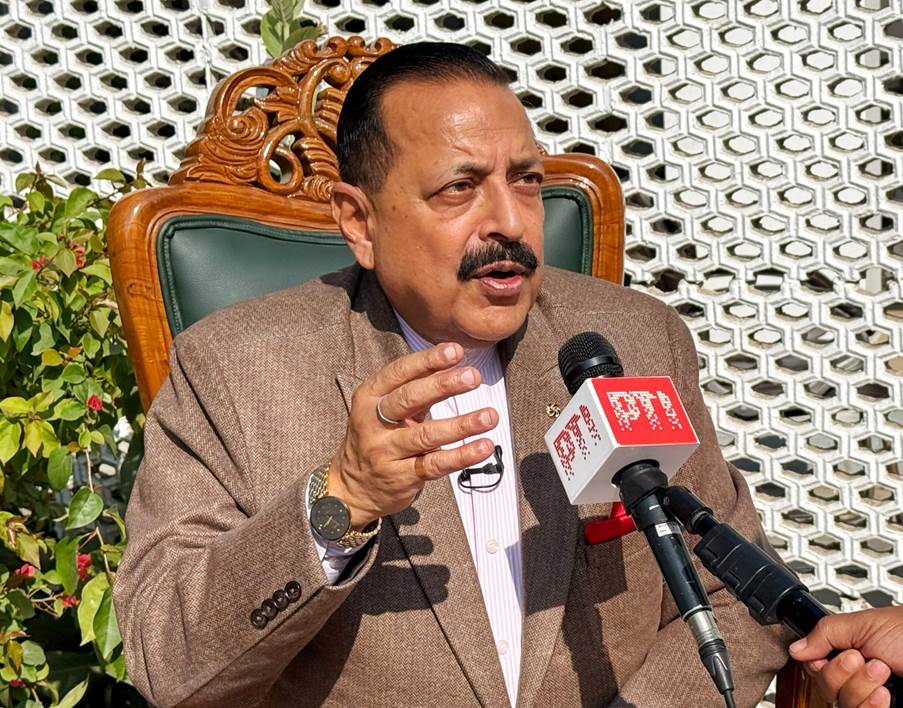Department of Atomic Energy
"Nuclear Mission" announced in the Union Budget 2025-26 will mark a transformative shift in India's energy landscape and will enable Nuclear Power to emerge as a major source of energy in India.: Union Minister Dr. Jitendra Singh
₹20,000 crore for R&D in Small Modular Reactors, targeting at least five indigenously designed operational SMRs by 2033: Dr. Singh
Posted On:
05 FEB 2025 7:21PM by PIB Delhi
Union Minister Dr. Jitendra Singh, in an exclusive media interview, said here today that the "Nuclear Mission" announced in the Union Budget 2025-26 will mark a transformative shift in India's energy landscape and will enable Nuclear Power to emerge as a major source of energy in India.
Union Minister of State (Independent Charge) for Science and Technology, Minister of State (Independent Charge) for Earth Sciences, Minister of State in the Prime Minister’s Office, Department of Atomic Energy, Department of Space, and Personnel, Public Grievances, and Pensions, Dr. Jitendra Singh, underscored the crucial role of nuclear power in ensuring India's energy security. He emphasized the government's futuristic roadmap for the nuclear energy sector, which will significantly contribute to achieving self-sufficiency in energy production.

Dr. Jitendra Singh hailed the revolutionary decision to provide tax relief on income up to ₹12 lakh, noting that this initiative will bring satisfaction to a large section of the population and have a multiplier effect on the economy.
In a landmark move, Dr Jitendra Singh hailed the announcement that India's nuclear energy sector has been opened for private sector participation. Calling this step "revolutionary," he noted that for 60-70 years, the sector operated under secrecy. Now, with greater openness and collaboration, India can accelerate growth and innovation in nuclear energy, aligning with the vision of Aatmanirbhar Bharat.
Dr. Jitendra Singh recalled how Prime Minister Narendra Modi’s decision to open the Space sector for private players transformed the industry. He expressed confidence that the nuclear sector will experience similar growth and innovation, leading to a major shift in energy security.
Highlighting India's reliance on petroleum imports, Dr. Jitendra Singh reaffirmed the government's commitment to clean and sustainable energy solutions. And categorically mentioned that nuclear energy will be a major source of India’s energy security.
Recognizing nuclear power as a cornerstone for energy security, the government has introduced the Nuclear Energy Mission for Viksit Bharat, aiming to enhance domestic nuclear capabilities, promote private sector participation, and deploy advanced nuclear technologies.
The Union Budget 2025-26 has allocated ₹20,000 crore for R&D in Small Modular Reactors, targeting at least five indigenously designed operational SMRs by 2033. This aligns with India's target of 100 GW nuclear power capacity by 2047, a major step toward reducing carbon emissions and ensuring energy sustainability.

Dr. Jitendra Singh informed that India’s nuclear power capacity, currently at 8,180 MW, is set to expand to 22,480 MW by 2031-32, with ten reactors under construction across Gujarat, Rajasthan, Tamil Nadu, Haryana, Karnataka, and Madhya Pradesh. Additionally, plans for ten more reactors are in progress, with a major 6 x 1208 MW nuclear power plant in collaboration with the USA at Kovvada, Andhra Pradesh.
He shared that a significant milestone was achieved on September 19, 2024, when the Rajasthan Atomic Power Project’s Unit-7 (RAPP-7) reached criticality, marking the beginning of a controlled fission chain reaction—an achievement highlighting India’s growing nuclear prowess.
Dr. Singh reaffirmed India's commitment to achieving 500 GW of non-fossil fuel-based energy generation by 2030, in line with its COP26 pledge, and PM Modi’s vision for net-zero emissions by 2070 he remarked that it was Prime Minister Modi who initiated the Mission LiFE. He emphasized that India's approach to nuclear and biotech advancements follows a whole-of-government and whole-of-science model, ensuring integrated progress.
Dr. Singh also introduced the recently announced BIOe3 Policy, India's first-of-its-kind initiative to foster a biotechnology-driven industrial revolution. He emphasized the creation of BIRAC, a platform to support biotech startups and facilitate collaborations with the Department of Biotechnology. India has already seen success in biotechnology, with achievements such as the development of its first antibiotic Nafithromycin and the Human Papilloma Virus (HPV) vaccine.
The BIOe3 Policy will drive advancements in bio-manufacturing, bio-foundries, and circular economy models, promoting recyclable and reusable products under the "Wealth from Waste" concept. This initiative is expected to spur economic growth, generate employment, and foster environmental sustainability.
Towards the conclusion Dr. Jitendra Singh reiterated that provisions for nuclear power in Union Budget 2025-26 mark a transformative shift in India's energy landscape. By expanding nuclear energy as a sustainable, scalable, and secure power source, the government aims to bolster energy security and meet the nation’s long-term economic and environmental goals. Dr. Singh reaffirmed that the Nuclear Energy Mission for Viksit Bharat is poised to accelerate nuclear power development, positioning India as a global leader in advanced nuclear technology by 2047.
*****
NKR/PSM
(Release ID: 2100108)
Visitor Counter : 7117